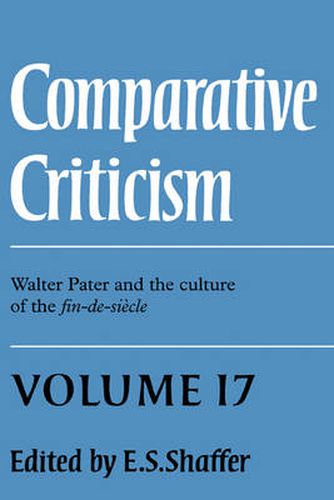Readings Newsletter
Become a Readings Member to make your shopping experience even easier.
Sign in or sign up for free!
You’re not far away from qualifying for FREE standard shipping within Australia
You’ve qualified for FREE standard shipping within Australia
The cart is loading…






This volume treats conceptions of the fin-de-siele as they were affected and characterized by the work of Walter Pater, the leading -century English art critic after Ruskin, essayist and novelist, and major influence on the temper and style of the ‘aesthetic’ and ‘decadent’ movements. Denis Donoghue recreates the sceptical spirit of Pater for our time; Richard Wollheirn deals with his philosophical claims in relation to his writerly practice; Wolfgang Iser with the ‘translatability’ of Paterian discourse in the current context of interpretation theory; Nicholas Shrimpton with Pater’s place in the ‘aesthetical sect’; Billie Inman with the gender role-playing that characterized the ‘Grecian’ attitude, in particular the mode of ‘subservient love’, which affected Oscar Wilde and his friends among others. On the larger European scene David Carrier treats the decisive role of Baudelaire in the movement towards Modernism in writing and painting, and the subterranean forms in which he was imported. Stephen Bann sums up the relation of Pater’s viewpoints to the nature of representation. The first publication of an important work, believed lost, of Pater’s major disciple, the twentieth-century art critic Adrian Stokes, is featured in this volume. Richard Read has found, edited, and introduced Stokes’s essay on the artist Pisanello, the first of four essays an the Renaissance Tempio Malatestiano at Rimini. Stokes’s complex relationship with Pound at the time of the Cantos is also explored, as Modernists sought to distance themselves from the aesthetic mode in which they had been nurtured. Joseph Farrell examines the relation of the fin-de-siele drama such as Feydeau on Modernist and Absurdist playwrights like Ionesco and Dario Fo, and translates Fo’s play Women in the Nude and Bodies in the Post. Simon Curtis, reviewing Jahan Ramazani’s Poetry of Mourning. The Modern Elegy from Hardy to Heaney, displays the changing forms of the traditional elegy through the fin-de-siele to the present.
$9.00 standard shipping within Australia
FREE standard shipping within Australia for orders over $100.00
Express & International shipping calculated at checkout
This volume treats conceptions of the fin-de-siele as they were affected and characterized by the work of Walter Pater, the leading -century English art critic after Ruskin, essayist and novelist, and major influence on the temper and style of the ‘aesthetic’ and ‘decadent’ movements. Denis Donoghue recreates the sceptical spirit of Pater for our time; Richard Wollheirn deals with his philosophical claims in relation to his writerly practice; Wolfgang Iser with the ‘translatability’ of Paterian discourse in the current context of interpretation theory; Nicholas Shrimpton with Pater’s place in the ‘aesthetical sect’; Billie Inman with the gender role-playing that characterized the ‘Grecian’ attitude, in particular the mode of ‘subservient love’, which affected Oscar Wilde and his friends among others. On the larger European scene David Carrier treats the decisive role of Baudelaire in the movement towards Modernism in writing and painting, and the subterranean forms in which he was imported. Stephen Bann sums up the relation of Pater’s viewpoints to the nature of representation. The first publication of an important work, believed lost, of Pater’s major disciple, the twentieth-century art critic Adrian Stokes, is featured in this volume. Richard Read has found, edited, and introduced Stokes’s essay on the artist Pisanello, the first of four essays an the Renaissance Tempio Malatestiano at Rimini. Stokes’s complex relationship with Pound at the time of the Cantos is also explored, as Modernists sought to distance themselves from the aesthetic mode in which they had been nurtured. Joseph Farrell examines the relation of the fin-de-siele drama such as Feydeau on Modernist and Absurdist playwrights like Ionesco and Dario Fo, and translates Fo’s play Women in the Nude and Bodies in the Post. Simon Curtis, reviewing Jahan Ramazani’s Poetry of Mourning. The Modern Elegy from Hardy to Heaney, displays the changing forms of the traditional elegy through the fin-de-siele to the present.